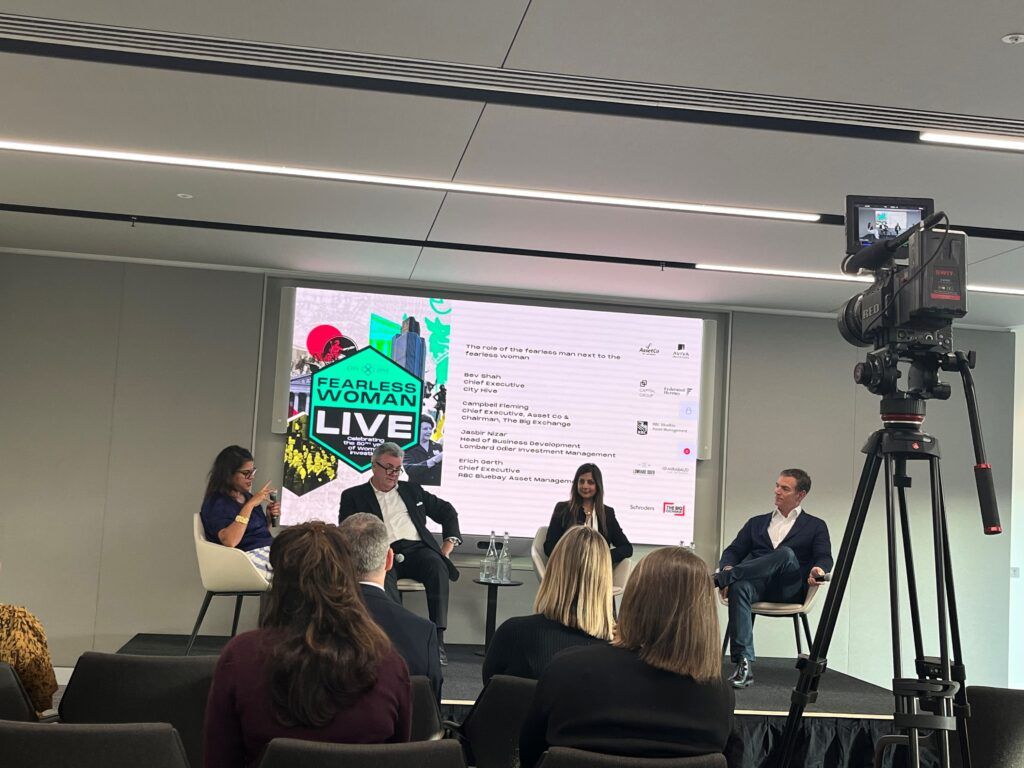Don’t be afraid to make mistakes, speak up and find your voice, and move away from “star” fund management were the tips shared by senior members of the investment industry at a City Hive event this week.
As part of City Hive’s Fearless Woman campaign, which celebrates 50 years of women investing and is covered exclusively by ESG Clarity, topics such as gendered stereotypes, cognitive diversity and the role of the “fearless man next to the fearless woman” were tackled by panels of investment professionals at Fearless Woman Live.
Summing up one of the benefits of diverse teams, Uzo Ekwue, equity research analyst on the British Opportunities Trust at Schroders, said: “A team that has a combination of different backgrounds is very important. Having people from all walks of life enriches the conversations we have. Our experiences ultimately lead to different decisions.”
She added during her 14-year career, she spent four-to-five years in frontier markets, which has “really changed my perception of risk, for example”.
Erich Gerth, chief executive of BlueBay and head of RBC Global Asset Management EMEA-APAC, who came to live in the UK from the US in 2003, said he considers London to be the “most diverse place on earth” but not all companies are taking advantage of it.
‘It’s ok to fail’
Throughout the event, panel members encouraged attendees to not be worried about making mistakes while trying to improve diversity within the workforce. “Making a mistake because you want to learn is a mistake worth making,” commented Abi Sater, CEO at The Big Exchange, while City Hive’s chief strategist Mandy Kirby added teams that were honest with each other about mistakes made were often the most effective.
BlueBay’s Gerth said he sees companies lose “good people”, referring to women that take a career break to start a family and not being able to easily return, and then the firm has to go and try and recruit from “a small pool of talent”.
“We need to create a growth mindset around this and not be afraid to make mistakes,” he said.
“When people make mistakes, and it’s without malicious intent, they are not held accountable. Mistakes should be seen as opportunities to learn rather than persecute, and in the case of diversity, there is a business purpose – it is to pursue better outcomes.
“It’s ok to fail and plan B is perfectly acceptable.”
Sharing a mistake she has made, Laurence Bensafi, portfolio manager and deputy head of emerging markets equities at RBC Global Asset Management, said: “Earlier in my career I remember hiring someone exactly the same as me. We need to do the opposite for diversity of perspective, we know diversity adds a lot of value.”
Star fund managers
Panellists were also asked to share their advice to clients in terms of pushing for diversity, and City Hive’s CEO Bev Shah noted the “woeful lack of female fund managers” is likely down to investors’ and fund selectors’ requirement to only invest in strategies where the fund and manager has a three-year track record.
“When I was a fund selector, we would have salespeople saying ‘I don’t know when they might go off and have a baby, and we need a three-year track record’,” she told attendees.
Gerth agreed: “We had this problem of when someone takes a career break, it created problems with the investor base.
“We do need investors to not be so focused on three-year returns for diversity among fund managers to move in the right direction. It has been the default to ask for a three or even five year track record for competence.
“But the industry is starting to move away from the star fund manager system to a team management approach, which will help with not being so dependent on one individual. It creates an environment where people can move out and then back into the business without disrupting their careers [and the investor base].”
However, he said he isn’t sure this is something that is being fully considered by all wealth managers when carrying out their research.
“There are more diverse analysts coming in looking at funds and asking questions on diversity, but the jury is still out on whether they are continuing to use this criteria or not.”
‘Know your value’
In another discussion on how women can further their careers, Campbell Fleming, chief executive at AssetCo and chairman of The Big Exchange, said he may have an unpopular opinion:
“This may be controversial; what we need to change, and I think it will, is people finding their voice and saying what they think.
“I am naturally a blunt and open person, and I don’t have the time to candy coat things sometimes.
“But I often sit in rooms with women CEOs that want to contribute and don’t. Their male counterparts will voice their thoughts quickly – and they tend not to be considered or thoughtful.”
He advised: “No one knows how good you are unless you start talking. Know your value.”

Jasbir Nizar, head of business development at Lombard Odier Investment Management, agreed this will change in time.
“I feel optimistic about women and minorities finding their voices,” she said.
“We are seeing more people have the courage to speak up, but we need to ensure we are creating environments for them to do so. That change will come, and men have a great opportunity to make a difference for the women in their organisations by encouraging them to do so.”
Top tips
Throughout the sessions, the panellists shared their own tips on how companies can progress in terms of diversity.
Kim Lewis, head of active ownership at Schroders, said she would like to see more disclosure of salaries in job listings and discussions around childcare, while The Big Exchange’s Sater encouraged “open, honest and transparent conversations” to become more inclusive.
Baylee Wakefield, multi-asset fund manager at Aviva Investors, commented on how the firm’s Return to Work scheme is a huge plus for her for a number of reasons: “Aviva runs a Return to Work scheme for those that have had an 18 month+ career break. What people don’t realise is the effect this has on the junior team members.
“I know there are role models within my business that are coming back to work – I can ask them questions and get their support. It’s also a huge positive to know that a career break is a possibility for me.”








